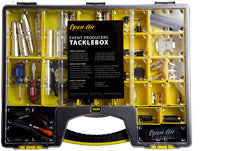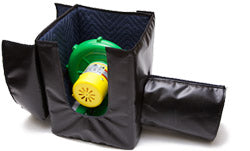
.
On the outskirts of Nairobi, in the midst of a field filled with crickets and frogs, moviegoers can buy a ticket to another era at Kenya's last outdoor movie show. The Fox is the last drive-in movie theater in the country, aside from the makeshift screens that people jimmy together on the sides of buildings. This is a proper drive-in built just after World War II with box-office toll booths, a long, curving driveway, an expansive green and a brigade of upright speakers that look like something Gary Cooper might have tied his horse to.
The screen 120 feet by 70 feet is the kind of screen that makes you think of floodlights crisscrossing the sky, of horses galloping after a stage coach, of John Ford and Cecil B. De Mille and Barbara Stanwyck, who really knew how to walk across a room.
Under A Kissing Moon
On a recent night, a handsome moon hangs in the Kenyan sky. It's just a crescent, really, but no less illuminating than a well-placed comma in a line of verse.
Major Michael Kinyua, who manages operations for the drive-in and other Fox theaters in the country, reminisces. He remembers seeing a rerun of The Ten Commandments on the drive-in's outdoor movie screen in the late 1970s, relaxing with his honey in the back seat of a sedan.
"I came with friends, with our girlfriends," he says, with a big laugh. "Here in your car, you can hold. You can hug. [There's] a lot of freedom in your car."
Under those circumstances, it's unclear whether Kinyua saw God sear all Ten Commandments onto stone tablets. Like everybody else, he had to take Moses' word for it.
Back then, people did a fair amount of canoodling in their cars on a night like this, under a moon like this a kissing moon. And some things don't change. But the Fox certainly has.
From All-White To All Kenyans
During colonial times, Kinyua and his pals would never have gotten into the outdoor films at the Fox. Only white patrons came and most were British servicemen and their sweethearts, or families.
With independence in 1963, the rest of Kenya came to sit under the stars: Arabs, Somalis, black people and Kenyans of South Asian descent.
One patron of the Fox, 47-year-old Dinesh Harani, wants to be a star.
"I go to the gym, and I look young, you see. If I dye my hair, and if they put a nice effect on the lighting and the makeup, you look more young. You look even 30 years old on the screen," he says.
Truth is, there aren't enough movie lovers like Harani at the outdoor cinema. "Slowly, slowly," as the Kenyans say, business has dropped off.
A Night At The Drive-In
On a recent night, the great lawn is virtually empty. The road outside is one of the area's busiest, but only nine cars occupy a space that can hold more than 500. Twentieth Century Fox sold its interest years ago. And now, the movies that play here are exclusively Bollywood, straight from Mumbai.
But it's better to see them than to hear them. The outdoor speakers are so bad these days that sometimes the sound seems like it's come from another galaxy.
Isaac Musina is a black Kenyan who has been the projectionist at the theater for nearly 40 years. He has learned to love Bollywood movies, even though he doesn't speak a word of Hindi.
Musina dances between two enormous projectors that look like what Orson Welles might have leaned on for inspiration.
The room is immaculate, with fans whirring and tubes of cool water coursing through the machines to keep the celluloid from melting on the spools. Giant reels of 35 mm film the size of extra-large pizza pies turn and click.
Musina watches the print, closely. He is waiting for a signal that comes onto the screen, letting him know it's time to fire up the other projector with a new reel. Call it the secret language of projectionists. Most people don't notice.
"It's a small dot on the right side," Musina says.
At intermission every movie shown at the drive-in stops for a 10-minute interval Kalpana Bhanderi bypasses the gleaming candy stand and walks her two children back to the cafeteria where they can get hot, thick french fries and, unfortunately, thin ketchup. Her kids are 7 and 9 years old and, frankly, you wouldn't want to sit next to them in a movie theater. Neither does she.
"If they want to misbehave, they can misbehave in the car. Like in theaters, they can't make noise. They have to sit in one place. So drive-ins are better," she says.
Time, Economics Take Their Toll
But nine cars and french fries won't pay the electricity bill at the Fox, or the workers, or the minimum $3,000 that it costs to get a film from India past customs and approval from the Kenya Film Censorship Board not when hawkers on the streets of Nairobi don't pay taxes at all. The hawkers sell black market DVDs of the latest releases for about $4 each, and there are sometimes 25 movies on a single DVD.
That's partly why the folks who own the Fox Drive-In are going to tear it down. They have prime real estate that could be making them a lot more money. In the coming months, they are planning to build residential housing, a mall and, yes, a six-screen multiplex. Apparently, the future of Kenya's entertainment business is indoors.
But who knows? Perhaps on the ceiling of that multiplex, the developers will paint some stars and a great big kissing moon.
Source: "Curtain Call For Kenya's Last Outdoor Picture Show" by Gwen Thompkins -NPR, All Things Considered. Read full article at: http://www.npr.org/templates/story/story.php?storyId=102168350.
 .
On the outskirts of Nairobi, in the midst of a field filled with crickets and frogs, moviegoers can buy a ticket to another era at Kenya's last outdoor movie show. The Fox is the last drive-in movie theater in the country, aside from the makeshift screens that people jimmy together on the sides of buildings. This is a proper drive-in built just after World War II with box-office toll booths, a long, curving driveway, an expansive green and a brigade of upright speakers that look like something Gary Cooper might have tied his horse to.
The screen 120 feet by 70 feet is the kind of screen that makes you think of floodlights crisscrossing the sky, of horses galloping after a stage coach, of John Ford and Cecil B. De Mille and Barbara Stanwyck, who really knew how to walk across a room.
Under A Kissing Moon
On a recent night, a handsome moon hangs in the Kenyan sky. It's just a crescent, really, but no less illuminating than a well-placed comma in a line of verse.
Major Michael Kinyua, who manages operations for the drive-in and other Fox theaters in the country, reminisces. He remembers seeing a rerun of The Ten Commandments on the drive-in's outdoor movie screen in the late 1970s, relaxing with his honey in the back seat of a sedan.
"I came with friends, with our girlfriends," he says, with a big laugh. "Here in your car, you can hold. You can hug. [There's] a lot of freedom in your car."
Under those circumstances, it's unclear whether Kinyua saw God sear all Ten Commandments onto stone tablets. Like everybody else, he had to take Moses' word for it.
Back then, people did a fair amount of canoodling in their cars on a night like this, under a moon like this a kissing moon. And some things don't change. But the Fox certainly has.
From All-White To All Kenyans
During colonial times, Kinyua and his pals would never have gotten into the outdoor films at the Fox. Only white patrons came and most were British servicemen and their sweethearts, or families.
With independence in 1963, the rest of Kenya came to sit under the stars: Arabs, Somalis, black people and Kenyans of South Asian descent.
One patron of the Fox, 47-year-old Dinesh Harani, wants to be a star.
"I go to the gym, and I look young, you see. If I dye my hair, and if they put a nice effect on the lighting and the makeup, you look more young. You look even 30 years old on the screen," he says.
Truth is, there aren't enough movie lovers like Harani at the outdoor cinema. "Slowly, slowly," as the Kenyans say, business has dropped off.
A Night At The Drive-In
On a recent night, the great lawn is virtually empty. The road outside is one of the area's busiest, but only nine cars occupy a space that can hold more than 500. Twentieth Century Fox sold its interest years ago. And now, the movies that play here are exclusively Bollywood, straight from Mumbai.
But it's better to see them than to hear them. The outdoor speakers are so bad these days that sometimes the sound seems like it's come from another galaxy.
Isaac Musina is a black Kenyan who has been the projectionist at the theater for nearly 40 years. He has learned to love Bollywood movies, even though he doesn't speak a word of Hindi.
Musina dances between two enormous projectors that look like what Orson Welles might have leaned on for inspiration.
The room is immaculate, with fans whirring and tubes of cool water coursing through the machines to keep the celluloid from melting on the spools. Giant reels of 35 mm film the size of extra-large pizza pies turn and click.
Musina watches the print, closely. He is waiting for a signal that comes onto the screen, letting him know it's time to fire up the other projector with a new reel. Call it the secret language of projectionists. Most people don't notice.
"It's a small dot on the right side," Musina says.
At intermission every movie shown at the drive-in stops for a 10-minute interval Kalpana Bhanderi bypasses the gleaming candy stand and walks her two children back to the cafeteria where they can get hot, thick french fries and, unfortunately, thin ketchup. Her kids are 7 and 9 years old and, frankly, you wouldn't want to sit next to them in a movie theater. Neither does she.
"If they want to misbehave, they can misbehave in the car. Like in theaters, they can't make noise. They have to sit in one place. So drive-ins are better," she says.
Time, Economics Take Their Toll
But nine cars and french fries won't pay the electricity bill at the Fox, or the workers, or the minimum $3,000 that it costs to get a film from India past customs and approval from the Kenya Film Censorship Board not when hawkers on the streets of Nairobi don't pay taxes at all. The hawkers sell black market DVDs of the latest releases for about $4 each, and there are sometimes 25 movies on a single DVD.
That's partly why the folks who own the Fox Drive-In are going to tear it down. They have prime real estate that could be making them a lot more money. In the coming months, they are planning to build residential housing, a mall and, yes, a six-screen multiplex. Apparently, the future of Kenya's entertainment business is indoors.
But who knows? Perhaps on the ceiling of that multiplex, the developers will paint some stars and a great big kissing moon.
Source: "Curtain Call For Kenya's Last Outdoor Picture Show" by Gwen Thompkins -NPR, All Things Considered. Read full article at: http://www.npr.org/templates/story/story.php?storyId=102168350.
.
On the outskirts of Nairobi, in the midst of a field filled with crickets and frogs, moviegoers can buy a ticket to another era at Kenya's last outdoor movie show. The Fox is the last drive-in movie theater in the country, aside from the makeshift screens that people jimmy together on the sides of buildings. This is a proper drive-in built just after World War II with box-office toll booths, a long, curving driveway, an expansive green and a brigade of upright speakers that look like something Gary Cooper might have tied his horse to.
The screen 120 feet by 70 feet is the kind of screen that makes you think of floodlights crisscrossing the sky, of horses galloping after a stage coach, of John Ford and Cecil B. De Mille and Barbara Stanwyck, who really knew how to walk across a room.
Under A Kissing Moon
On a recent night, a handsome moon hangs in the Kenyan sky. It's just a crescent, really, but no less illuminating than a well-placed comma in a line of verse.
Major Michael Kinyua, who manages operations for the drive-in and other Fox theaters in the country, reminisces. He remembers seeing a rerun of The Ten Commandments on the drive-in's outdoor movie screen in the late 1970s, relaxing with his honey in the back seat of a sedan.
"I came with friends, with our girlfriends," he says, with a big laugh. "Here in your car, you can hold. You can hug. [There's] a lot of freedom in your car."
Under those circumstances, it's unclear whether Kinyua saw God sear all Ten Commandments onto stone tablets. Like everybody else, he had to take Moses' word for it.
Back then, people did a fair amount of canoodling in their cars on a night like this, under a moon like this a kissing moon. And some things don't change. But the Fox certainly has.
From All-White To All Kenyans
During colonial times, Kinyua and his pals would never have gotten into the outdoor films at the Fox. Only white patrons came and most were British servicemen and their sweethearts, or families.
With independence in 1963, the rest of Kenya came to sit under the stars: Arabs, Somalis, black people and Kenyans of South Asian descent.
One patron of the Fox, 47-year-old Dinesh Harani, wants to be a star.
"I go to the gym, and I look young, you see. If I dye my hair, and if they put a nice effect on the lighting and the makeup, you look more young. You look even 30 years old on the screen," he says.
Truth is, there aren't enough movie lovers like Harani at the outdoor cinema. "Slowly, slowly," as the Kenyans say, business has dropped off.
A Night At The Drive-In
On a recent night, the great lawn is virtually empty. The road outside is one of the area's busiest, but only nine cars occupy a space that can hold more than 500. Twentieth Century Fox sold its interest years ago. And now, the movies that play here are exclusively Bollywood, straight from Mumbai.
But it's better to see them than to hear them. The outdoor speakers are so bad these days that sometimes the sound seems like it's come from another galaxy.
Isaac Musina is a black Kenyan who has been the projectionist at the theater for nearly 40 years. He has learned to love Bollywood movies, even though he doesn't speak a word of Hindi.
Musina dances between two enormous projectors that look like what Orson Welles might have leaned on for inspiration.
The room is immaculate, with fans whirring and tubes of cool water coursing through the machines to keep the celluloid from melting on the spools. Giant reels of 35 mm film the size of extra-large pizza pies turn and click.
Musina watches the print, closely. He is waiting for a signal that comes onto the screen, letting him know it's time to fire up the other projector with a new reel. Call it the secret language of projectionists. Most people don't notice.
"It's a small dot on the right side," Musina says.
At intermission every movie shown at the drive-in stops for a 10-minute interval Kalpana Bhanderi bypasses the gleaming candy stand and walks her two children back to the cafeteria where they can get hot, thick french fries and, unfortunately, thin ketchup. Her kids are 7 and 9 years old and, frankly, you wouldn't want to sit next to them in a movie theater. Neither does she.
"If they want to misbehave, they can misbehave in the car. Like in theaters, they can't make noise. They have to sit in one place. So drive-ins are better," she says.
Time, Economics Take Their Toll
But nine cars and french fries won't pay the electricity bill at the Fox, or the workers, or the minimum $3,000 that it costs to get a film from India past customs and approval from the Kenya Film Censorship Board not when hawkers on the streets of Nairobi don't pay taxes at all. The hawkers sell black market DVDs of the latest releases for about $4 each, and there are sometimes 25 movies on a single DVD.
That's partly why the folks who own the Fox Drive-In are going to tear it down. They have prime real estate that could be making them a lot more money. In the coming months, they are planning to build residential housing, a mall and, yes, a six-screen multiplex. Apparently, the future of Kenya's entertainment business is indoors.
But who knows? Perhaps on the ceiling of that multiplex, the developers will paint some stars and a great big kissing moon.
Source: "Curtain Call For Kenya's Last Outdoor Picture Show" by Gwen Thompkins -NPR, All Things Considered. Read full article at: http://www.npr.org/templates/story/story.php?storyId=102168350.





